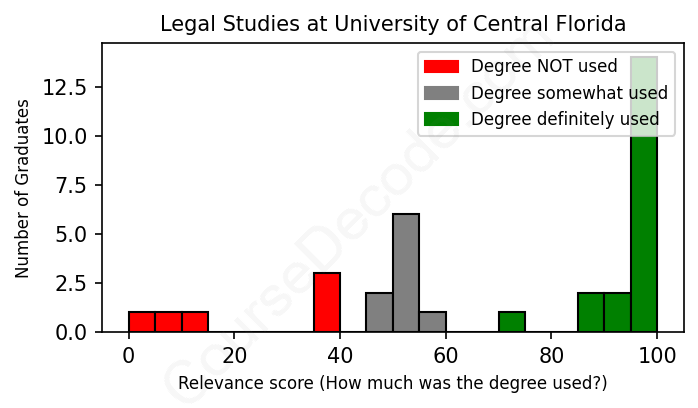
First, some facts. Of the Legal Studies graduates from University of Central Florida we've analyzed , here's how many have used (or NOT used) their degree in their career:

These are estimates based on AI analysis of 34 LinkedIn profiles (see below).
The verdict? Slightly above average. Overall, with an average relevance score of 70%, Legal Studies graduates from University of Central Florida have a slightly higher likelihood (+3%) of finding work in this field compared to the average graduate across all fields:
And for comparison, here's the chart for all profiles we've looked at across all degrees.
Also, after graduating, 47% of these graduates have pursued further education other than another Bachelor's degree (such as a Masters degree or other), compared to the average across all profiles of 35%. This suggests you may need more than just a Bachelors degree to be competitive as a Legal Studies graduate.
See the details:
|
Relevance score: 2% We think this person has NOT gone into a career related to their degree. We think this person has NOT gone into a career related to their degree.
DEGREE INFOGraduated in 2015 from University of Central Florida with a Bachelor of Science - BS in Legal Studies. No other secondary education since. JOB HISTORY SINCE GRADUATIONRetail Sales Consultant AT&T Nov 2017 - Mar 2019 Design Consultant  Renewal by Andersen Mar 2019 - Jul 2019 Technical Specialist  Apple Aug 2019 - Aug 2019 Technical Expert  Apple Aug 2019 - Present ABOUTInside sales and in home sales experience. Former voice actor and stuntman at Universal Studios Orlando. Former Division II athlete at Queens University of Charlotte. |
The top 10 most common jobs done by the graduates we've analyzed (ranked most common to least) are:
When looking at the job histories of UCF graduates who studied Legal Studies, you can see a mix of roles across various sectors, but not all of them are closely tied to the legal field. A significant number of positions filled by these graduates, like customer service roles and administrative jobs, don't really require much of the legal knowledge they might have gained during their studies. Instead, they often focus on general skills like communication and management. This trend suggests that while some graduates find positions that directly apply their legal studies background, a lot of them end up in jobs that don’t utilize those skills substantially.
However, there are graduates who have taken on roles such as law clerks, paralegals, and attorneys, which clearly align with their Legal Studies education. Many of those who have pursued law-related positions report that their jobs involve significant engagement with legal principles, making their studies completely relevant. It seems that those who navigated towards traditional legal careers tend to express that their degrees play an integral role in their daily work. In summary, while a fraction of UCF Legal Studies graduates successfully harness their education in legal careers, many find themselves in various other roles where the relevance is lower, showing a split in career applicability among graduates.
Here is a visual representation of the most common words in job titles for Legal Studies graduates (this is across all Legal Studies graduates we've analyzed, not just those who went to University of Central Florida):

Looking at the career paths of graduates from the University of Central Florida with a degree in Legal Studies, we see a mixed bag of trajectories. Many of these graduates land their first jobs in customer service roles, administrative positions, or as legal interns, which is quite common for recent grads. For instance, some started off as Customer Service Representatives or Legal Assistants, which could help them develop essential skills like communication and organization. However, the shift towards legal-related positions seems more evident in the longer run. By five years post-graduation, many have moved into more specialized roles within law firms, government agencies, or corporate legal departments. Some even find themselves climbing the ladder, transitioning into roles like attorney or legal compliance specialist. Others stay in adjacent fields, such as project management or administrative positions, which may not directly relate to their major.
Fast forward to ten years later, and a notable portion of these graduates appears to have settled into solid legal careers, becoming attorneys, clerks, or even project managers in reputable firms. For those who initially started in unrelated fields, some seem to have pivoted back into the legal sector or found that their experiences in customer service and management roles have enhanced their capabilities in legal settings. However, not everyone seems to transition directly into legal careers, as some have stayed in roles that are far removed from their studies. Overall, while there are success stories of graduates making significant strides in legal-related careers, there are also quite a few who appear to have drifted into fields that, while still offering growth, are not directly tied to their Legal Studies background. It paints a picture of a diverse set of outcomes, showcasing both the potential of the degree and the reality of the job market.
Getting a Bachelor’s degree in Legal Studies at the University of Central Florida (or pretty much anywhere) can be a bit of a mixed bag. It’s not necessarily the hardest degree out there, but it does have its challenges. You’ll be diving into subjects like legal research, ethics, and various areas of law, which can require a good bit of reading, writing, and critical thinking. If you enjoy analyzing information and debating ideas, you might find it pretty engaging, but if you struggle with those types of tasks, it could feel tougher. Overall, it’s kind of average in terms of difficulty — it has its demanding moments, but with some dedication and organization, most students can handle it.
Most commonly, in the LinkedIn profiles we've looked at, it takes people 2 years to finish a Bachelor degree in Legal Studies.
Looking at the career paths of these UCF Legal Studies graduates, it seems like many have landed some decent jobs, especially those who graduated a bit earlier. For instance, the ones who went into lawyering or corporate roles, like the attorneys and compliance specialists, likely earn a pretty good salary—especially after climbing the ranks. However, some positions, especially in customer service or internships, tend to start lower in pay and might not reflect the financial opportunities in the legal field. Plus, a few recent grads still seem to be working their way up, and their pay might not be stellar just yet. Overall, while there are definitely some solid earners in the mix, it’s a mixed bag depending on the specific job and when they graduated.
Here is a visual representation of the most common words seen in the "about" section of LinkedIn profiles who have a Bachelor degree in Legal Studies (this is across all Legal Studies graduates we've analyzed, not just those who went to University of Central Florida). This may or may not be useful:

Here are all colleges offering a Bachelor degree in Legal Studies (ordered by the average relevance score of their Legal Studies graduates, best to worst) where we have analyzed at least 10 of their graduates:
| College | Score | Count |
|---|---|---|
 University of Central Florida University of Central Florida
|
70 | 34 |
 University of California, Berkeley University of California, Berkeley
|
67 | 15 |
 Grand Valley State University Grand Valley State University
|
67 | 10 |
 Florida Gulf Coast University Florida Gulf Coast University
|
67 | 10 |
 St. John's University St. John's University
|
63 | 16 |
 Kaplan University Kaplan University
|
50 | 11 |
 University of California, Santa Cruz University of California, Santa Cruz
|
49 | 10 |